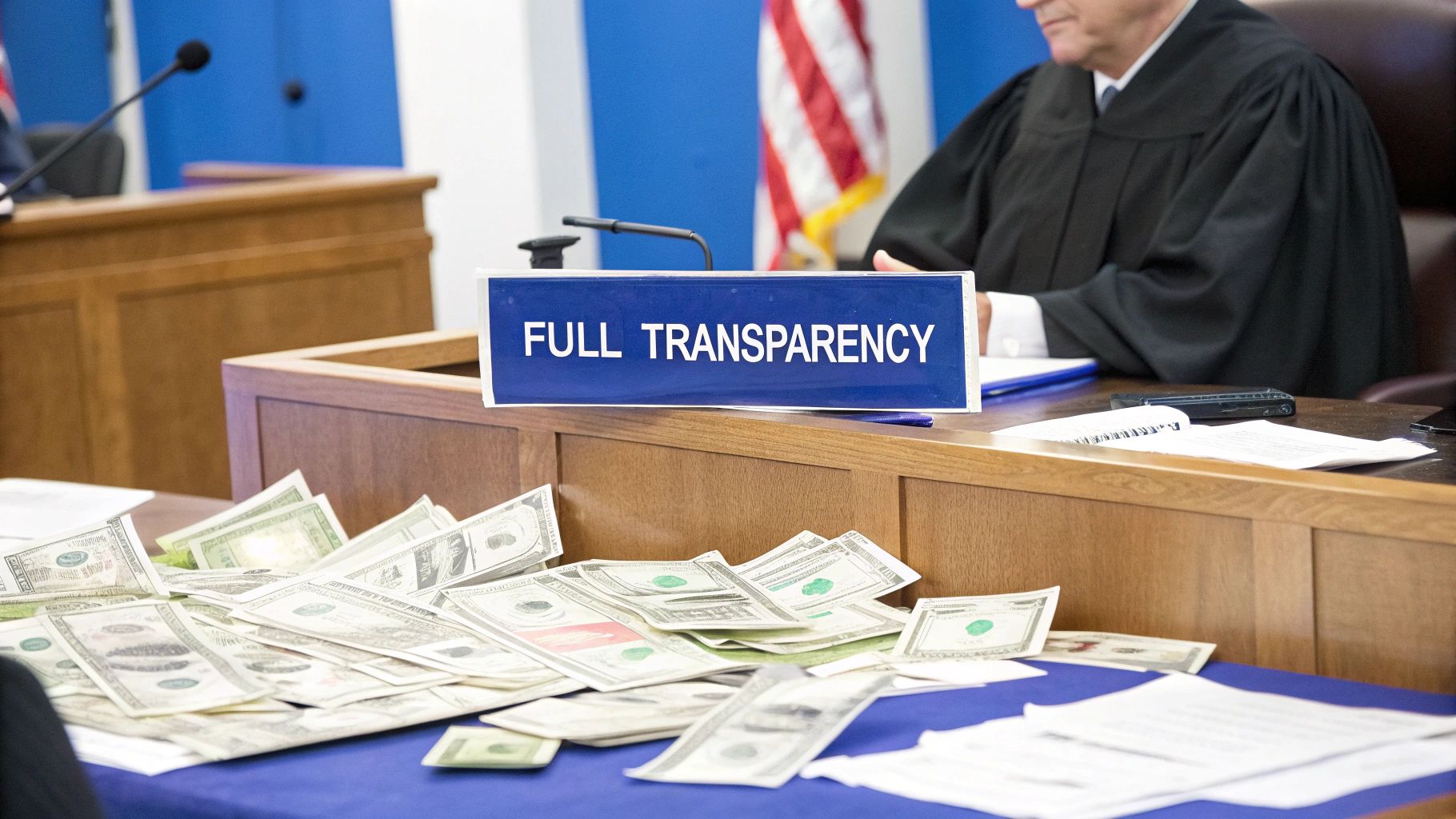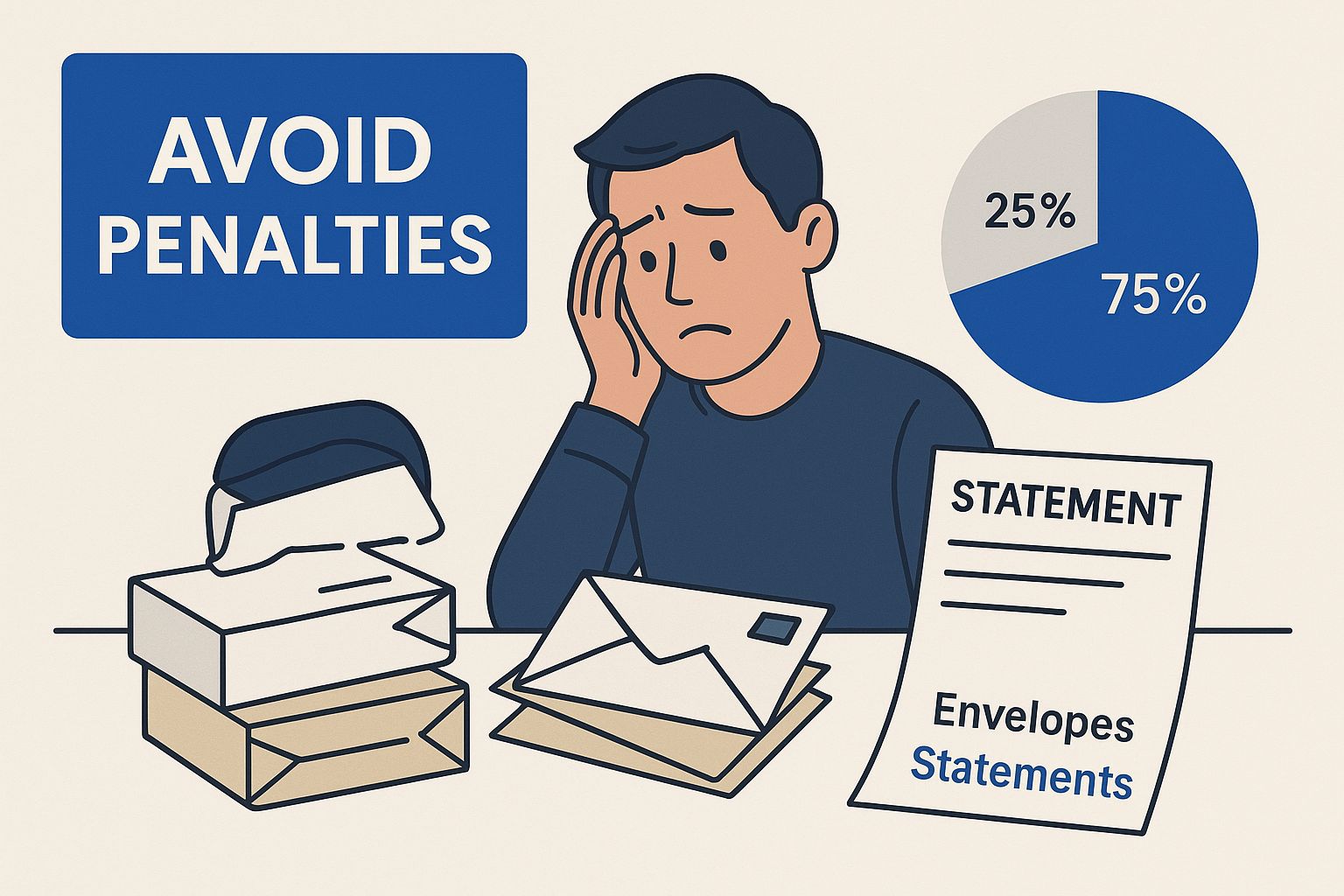Financial Disclosure Divorce: Essential Guide for Fair Results
If a couple wants a divorce and they want it to go smooth and not turn into a royal rumble they will have to do proper due diligence and obtain all the financial documents and proof they have and submit it to the attorney. This will help avoid a contested litigation filled divorce and allow the couple to come to a proper arrangement that works for them. Financial disclosure during a divorce is essential for a fair separation. It’s the foundation upon which equitable settlements are built. This process, though often stressful, aims to give both parties a complete understanding of the marital assets and debts.
This shared understanding is vital for negotiating a just division of property and ongoing financial obligations, such as spousal or child support. Without full financial disclosure, achieving a fair outcome becomes significantly harder.
Financial disclosure is especially important in jurisdictions like the United States, which emphasizes transparency. It’s a cornerstone of the divorce process, ensuring both sides provide comprehensive information about their assets, debts, income, and expenses.
In the U.S., the divorce rate per 1,000 married women was about 14.9 according to recent national surveys. This underscores how frequently divorce occurs and how vital financial disclosure is. This transparency helps prevent one spouse from unfairly benefiting from hidden assets or undisclosed income. Understanding financial terminology is also important.
Essential Documents for Financial Disclosure
While specific document requirements may vary by jurisdiction and financial complexity, certain documents are generally essential in almost every divorce involving financial disclosure. Gathering these documents and submitting them to your local divorce lawyer can be a daunting task. However, understanding their purpose can help lessen the stress.
The table below outlines the key documents often required and explains their significance.
To help you navigate this process, we’ve compiled a table outlining the essential documents needed for financial disclosure. It explains the information each document provides and why it’s crucial to have.
| Document Type | Information Provided | Why It’s Critical |
|---|---|---|
| Tax Returns | Income, deductions, investments | Establishes historical income and financial activity. |
| Bank Statements | Account balances, transactions | Shows current financial standing and spending patterns. |
| Pay Stubs | Current income, deductions | Verifies current employment and income levels. |
| Real Estate Documents | Ownership, mortgages, value | Determines ownership and equity in properties. |
| Retirement Account Statements | Account balances, contributions, investment performance | Determines value of retirement assets and potential division. |
| Loan Documents | Outstanding balances, payment history | Determines outstanding debt obligations. |
| Business Ownership Documents | Ownership structure, financials | Crucial for valuing and dividing business interests if applicable. |
This table provides a clear roadmap for gathering the necessary financial documentation for your divorce. Having these documents readily available will streamline the process and contribute to a more efficient and equitable outcome.
Importance of Accuracy and Completeness
Accurate and complete disclosure isn’t just recommended; it’s a legal requirement. Failing to disclose assets or providing misleading information can have significant legal consequences.
These consequences can include court-imposed financial penalties and may even affect custody arrangements. Furthermore, incomplete or inaccurate disclosure damages trust between the parties, making it more difficult to reach a mutually agreeable settlement. Honesty and transparency are crucial for a smooth and fair divorce process.
Navigating the Financial Disclosure Process Step-by-Step
Financial disclosure during a divorce can be a daunting task. This guide breaks down the process into manageable steps, helping you approach it with greater confidence. Thorough preparation and a clear understanding of the process can significantly reduce stress and promote a more equitable outcome.
Gathering Your Financial Information
The first crucial step involves gathering all relevant financial documentation. This comprehensive collection paints a clear picture of your financial landscape.
- Tax Returns: These provide a historical overview of your income and financial activities.
- Bank Statements: These documents illustrate your current financial status and spending habits.
- Pay Stubs: These verify your current employment and income level.
- Real Estate Documents: These confirm property ownership and any outstanding mortgages.
- Retirement Account Statements: These disclose the value of your retirement savings.
- Loan Documents: These outline any outstanding debts and loan terms.
- Business Ownership Documents: If applicable, these are essential for assessing the value of business interests.
Organizing these documents methodically from the outset will save time and reduce potential frustration later in the process. Consider using digital tools like Quicken or creating a spreadsheet to manage all the information effectively. A well-organized approach helps ensure no critical details are overlooked.
Completing the Financial Disclosure Forms
Many jurisdictions, including those using Form E, mandate specific forms for financial disclosure. These forms require detailed and accurate information regarding your:
- Assets
- Debts
- Income
- Expenses
Accuracy is paramount in this process. Errors or omissions can lead to delays or even legal consequences. Double-check every entry and seek clarification if anything is unclear. Meticulous attention to detail in this stage can prevent complications later on.
Exchanging Financial Information with Your Spouse
After completing the forms, they are exchanged with your spouse. This exchange fosters transparency and allows both parties to review the disclosed information. This reciprocal process provides an opportunity to ask for clarification or request additional documentation. Before submitting these documents, it’s crucial to have your legal counsel review them. An experienced divorce attorney can identify potential issues or inconsistencies.
Addressing Disputes and Seeking Clarification
Disagreements regarding disclosed information are not uncommon. If discrepancies arise, open communication is essential. Attempt to resolve these issues amicably through negotiation or mediation. If these methods prove unsuccessful, your attorney can assist in requesting further documentation or, if necessary, involve the court. A proactive approach to resolving disputes can prevent minor disagreements from escalating into major legal battles.
Timeline and Expectations
The timeframe for financial disclosure varies depending on the jurisdiction. Understanding these timelines is important for managing expectations. Some jurisdictions have strict deadlines, while others offer more flexibility. Stay informed about the specific requirements in your area, as failing to meet deadlines can result in penalties. Maintain consistent communication with your attorney throughout the process. They can provide guidance on the specific rules and deadlines applicable to your case, ensuring compliance and protecting your interests.
Beyond The Basics: Complex Assets In Divorce Disclosure
Financial disclosure in divorce usually involves common assets like bank accounts and real estate. But many couples also own more complex assets, requiring specialized handling during disclosure. These can include business ownership interests, equity compensation, cryptocurrency, international holdings, and intellectual property. These often demand more than traditional methods to ensure accurate valuation and fair distribution.
Unraveling Business Interests And Equity Compensation
Valuing a business during a divorce is rarely straightforward. Standard methods may not be sufficient, particularly for privately held companies. For instance, a startup’s future earning potential could be much higher than its current book value. This is where valuation experts become essential. They employ techniques like discounted cash flow analysis to project future earnings and arrive at a more precise present value. Likewise, equity compensation, such as stock options or restricted stock units, requires careful attention because of vesting schedules and future value.
Navigating The Cryptocurrency Landscape
Cryptocurrency adds unique difficulties to financial disclosure in divorce. Its volatile nature makes pinning down an accurate value challenging. The decentralized and sometimes anonymous nature of some cryptocurrencies can also complicate tracking and tracing holdings. Forensic accountants play a vital role in identifying and valuing cryptocurrency assets, frequently utilizing specialized software to analyze blockchain transactions.
This infographic illustrates the potential dangers of overlooking financial details. It underscores the importance of full disclosure to avoid penalties. The image of unopened statements and a worried individual visually represent the repercussions of inadequate financial preparation during divorce. Clearly, proactively understanding and disclosing all financial information is essential for a smooth and equitable process.
International Holdings And Intellectual Property
International holdings add another layer of complexity. Different countries have different laws regarding asset disclosure and division, making it challenging to access and value assets held abroad. Currency fluctuations can also significantly affect the value of these assets throughout the divorce process. Similarly, intellectual property, like patents, copyrights, and trademarks, can be difficult to value due to their intangible nature. Specialized appraisers can help determine the fair market value of these assets.
Valuation Methods for Complex Assets
To understand the different approaches and their suitability, the following table provides a comparative overview of common valuation methods used for complex assets in divorce proceedings.
| Asset Type | Valuation Method | Pros | Cons | When to Use |
|---|---|---|---|---|
| Business Interests | Discounted Cash Flow Analysis | Considers future earning potential | Requires projections, which can be uncertain | Privately held companies, startups with high growth potential |
| Business Interests | Market Approach | Uses comparable company sales to estimate value | May be difficult to find truly comparable companies | Publicly traded companies, established businesses with readily available market data |
| Equity Compensation | Black-Scholes Model | Widely accepted method for valuing options | Assumes certain market conditions that may not always hold true | Stock options, other publicly traded equity compensation |
| Cryptocurrency | Blockchain Analysis | Tracks transactions and identifies holdings | Volatility makes accurate valuation challenging | All types of cryptocurrency holdings |
| International Holdings | Asset-Based Valuation | Straightforward calculation of current market value | Doesn’t account for future appreciation or depreciation | Real estate, tangible assets held abroad |
| Intellectual Property | Income Approach | Estimates value based on potential future revenue streams | Requires complex projections of future income | Patents, copyrights, trademarks with established revenue streams |
| Intellectual Property | Cost Approach | Determines the cost to recreate the intellectual property | May not reflect true market value, especially for unique or innovative IP | Newly developed IP, IP with limited market comparables |
This table highlights the various methods used to assess complex assets, each with its own advantages and disadvantages. Selecting the right method is crucial for a fair outcome.
Securing Your Financial Future
Dealing with complex assets during divorce demands a proactive strategy. This means assembling a skilled team, including a divorce attorney experienced in complex asset division, a forensic accountant, and potentially other specialists. Working with these professionals helps ensure all assets are identified, accurately valued, and fairly distributed. Remember, full and accurate financial disclosure isn’t just a legal requirement; it’s vital for safeguarding your financial future.
When Disclosure Goes Wrong: Legal Consequences That Matter
Incomplete or misleading financial disclosure during a divorce can have serious legal ramifications. It’s not just about completing paperwork; it’s about ensuring a fair and equitable settlement. This section explores the potential consequences of inadequate disclosure.
Penalties and Sanctions for Non-Compliance
Courts prioritize accurate financial disclosure. Non-compliance can result in a range of penalties, impacting the final divorce settlement. Judges can impose fines or order the non-compliant party to pay the other spouse’s legal fees.
Failing to disclose assets can also lead to an unfavorable division of property, potentially awarding a larger share to the compliant spouse. In some cases, a judge may even strike pleadings, dismissing the claims or defenses of the dishonest party.
Impact on Settlement Outcomes
Accurate disclosure is the cornerstone of a fair settlement. Hiding assets or misrepresenting income can significantly skew the outcome. This can result in one party receiving substantially less than they are entitled to.
For example, if one spouse hides a valuable investment account, the other spouse might unknowingly agree to an unfair settlement. Discovering hidden assets later can lead to further legal battles to reopen the case, increasing the emotional and financial burden of the divorce.
Criminal Charges and Long-Term Consequences
Deliberately concealing assets during a divorce can lead to criminal charges like perjury or fraud. These charges have serious consequences beyond the divorce itself, including potential jail time and reputational damage.
Even without criminal charges, dishonest financial disclosure can have lasting personal and professional consequences. It can damage trust, strain relationships, and complicate future financial dealings.
Revisiting Finalized Agreements
Even after a divorce is finalized, the discovery of hidden assets can overturn the agreement. If one spouse can prove deliberate concealment, the court may reopen the case and revise the property division, potentially years later. This highlights the importance of initial transparency to avoid costly and stressful legal battles.
Ethical Considerations and Long-Term Interests
Financial disclosure isn’t solely about legal obligations; it’s also about ethical conduct. While hiding assets might seem advantageous in the short term, the long-term repercussions often outweigh any perceived gains.
Transparency fosters trust and facilitates a smoother divorce process, promoting a truly equitable outcome. By prioritizing honesty and full disclosure, individuals protect not only their financial interests but also their personal integrity and future well-being. Contacting a qualified divorce attorney, like those at Aronov Divorce Law NY, is crucial for navigating the complexities of financial disclosure and protecting your rights.
Protecting Your Financial Future During Disclosure
Protecting your financial future during a divorce depends heavily on understanding and actively participating in financial disclosure. This process is more than just a legal formality; it’s a vital step in ensuring a fair settlement. It involves not only accurately preparing your own disclosure but also carefully reviewing the information your spouse provides.
Preparing Your Disclosure: A Strategic Approach
Accuracy and completeness are paramount when preparing your financial disclosure. However, a strategic approach is equally important. Organize your documents meticulously, including all relevant information while safeguarding sensitive personal data. This careful approach minimizes the risk of overlooking crucial details and strengthens your negotiating position.
Here are some key strategies for an effective disclosure:
- Categorize Documents: Group similar documents, such as bank statements and tax returns, for easy access and review.
- Create a Timeline: Document the acquisition and disposition of assets throughout your marriage. This clarifies ownership and value.
- Maintain Confidentiality: Redact unnecessary personal information, like account numbers, not directly relevant to the financial disclosure.
This proactive, organized approach establishes a solid foundation for a fair and equitable outcome.
Evaluating Your Spouse’s Disclosure: Uncovering Hidden Truths
Receiving and reviewing your spouse’s financial disclosure is equally crucial. While assuming good faith is preferred, a thorough review of the documentation is essential. Look for inconsistencies, omissions, or unusual patterns that could indicate undisclosed assets or hidden income.
Here are some potential red flags to watch for:
- Unexplained Cash Withdrawals: Large or frequent cash withdrawals lacking clear explanations warrant further investigation.
- Discrepancies in Income Reporting: Compare reported income with tax returns and pay stubs to identify any potential underreporting.
- Suspicious Business Transactions: Scrutinize business records for unusual transfers or expenses that could be masking diverted funds.
Addressing these concerns promptly is crucial for protecting your financial interests.
Special Considerations for Complex Situations
Financial disclosure can be particularly challenging in complex financial situations. Business owners, professionals with complex compensation structures, and those with substantial inherited assets require extra vigilance.
- Business Owners: Accurate business valuations are essential and often require professional appraisal.
- Complex Compensation: Equity compensation, stock options, and deferred compensation plans require careful analysis to understand their current and future value.
- Inherited Assets: Clearly document the origin and separate nature of inherited assets to avoid their inclusion in the marital estate.
Seeking expert advice from financial professionals specializing in divorce can be invaluable in these situations. Statistical trends highlight how financial disclosure outcomes impact settlement equity and litigation duration. For instance, the median length of marriages ending in divorce is approximately 8 years, during which couples accumulate various assets requiring meticulous accounting during disclosure. Failure to fully disclose can lead to unequal settlements, often disadvantaging the less financially savvy spouse.
Strategic Timing and Ethical Considerations
While timing can be a strategic element in disclosure, operating within legal and ethical boundaries is paramount. Consult with your attorney to understand deadlines and determine the most advantageous approach for your specific situation. Transparency and honesty are essential. Short-term gains from hiding assets can result in severe legal consequences and long-term damage to your credibility. Approaching financial disclosure with integrity protects not only your financial well-being but also your peace of mind.
Building Your Professional Disclosure Team
A successful financial disclosure during a divorce relies heavily on the expertise of your professional team. Think of it as assembling a skilled group for a critical mission. You need a leader (your attorney), a strategist (a financial analyst), and possibly specialized experts (forensic accountants, appraisers). This section explores these key roles and how they contribute to achieving a fair and equitable outcome.
The Essential Roles: Attorneys and Financial Analysts
Your divorce attorney is your primary advocate, guiding you through the legal complexities of disclosure and ensuring your rights are protected. They interpret legal requirements, manage documentation, and represent you in negotiations or court proceedings. A skilled attorney can significantly influence the overall direction and efficiency of the process. For example, they can effectively challenge incomplete disclosures from the opposing party.
Financial decisions are made based on the assets and liabilities disclosed. Tips to improve cash flow during a divorce can be invaluable during this time. A divorce financial analyst, sometimes called a Certified Divorce Financial Analyst (CDFA®), brings specialized expertise in analyzing financial data within the context of divorce. They help you understand the long-term financial ramifications of different settlement options, empowering you to make informed decisions. Their expertise is particularly important in cases involving complex assets such as businesses or investments. For example, they can project the future value of retirement accounts.
Forensic Accountants and Appraisers: Specialized Support
Sometimes, specialized experts like forensic accountants and appraisers are crucial. Forensic accountants investigate potential hidden assets, analyze complex financial records, and provide expert testimony if needed. They’re like financial detectives, uncovering concealed funds or misrepresented income. For example, they might trace suspicious transactions.
Appraisers determine the fair market value of assets such as real estate, businesses, or unique collections. This objective valuation is critical when disputes arise over the value of marital property. For example, they can accurately assess the value of a family-owned business, providing a neutral basis for negotiation.
Building a Collaborative Team: Communication and Cost Management
Effective communication and collaboration among your professional team are essential. Regular meetings and clear communication protocols ensure everyone is working together towards your best interests. This collaborative approach also streamlines the process, saving valuable time and resources.
Managing professional relationships effectively helps control costs. Discuss billing practices upfront and understand how each professional charges for their services. Establish clear expectations about their scope of work to avoid unnecessary expenses. For example, clearly define the tasks for a forensic accountant to avoid open-ended investigations.
Choosing the Right Professionals: Key Questions and Red Flags
When selecting professionals, don’t hesitate to ask questions about their experience, qualifications, and approach to divorce cases. Look for professionals who prioritize collaboration and open communication. Red flags to watch for include:
- Lack of Specialization: A general financial advisor may not have the necessary expertise.
- Poor Communication: Unresponsiveness or unclear communication can hinder progress.
- Unrealistic Promises: Be wary of professionals who guarantee specific outcomes.
Building the right professional team can make a potentially stressful experience more manageable. By carefully selecting and managing your team, you can navigate financial disclosure with confidence and protect your financial well-being. For expert legal guidance, contact the experienced attorneys at Aronov Divorce Law NY.


Free Legal Consultation
98-14 Queens Blvd



